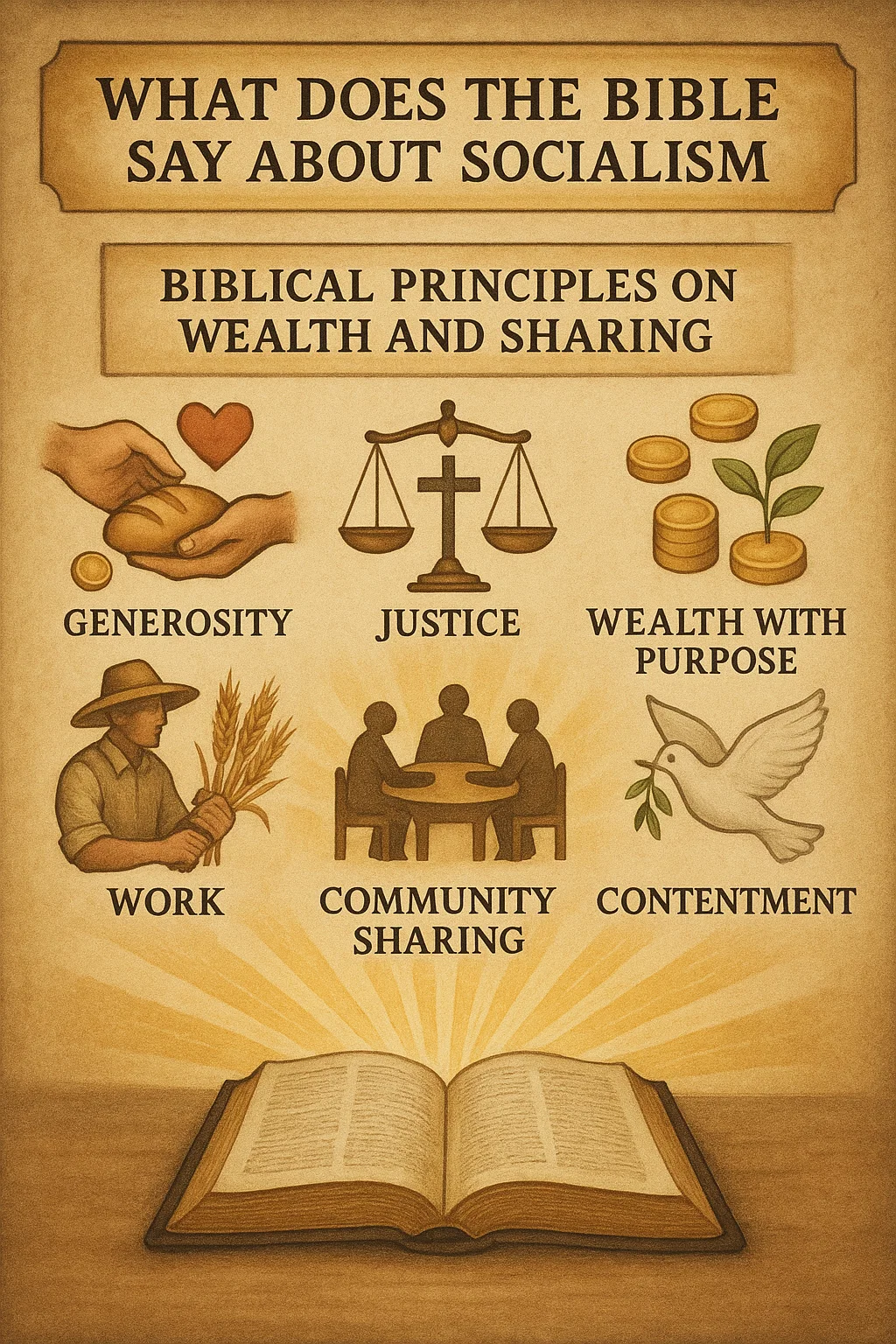 In every generation, people wrestle with how faith meets the real world especially when it comes to money, work, and how we care for one another. In today’s conversations, words like “socialism” and “capitalism” often spark debate. Some see one system as compassionate and the other as corrupt; others see the reverse.
In every generation, people wrestle with how faith meets the real world especially when it comes to money, work, and how we care for one another. In today’s conversations, words like “socialism” and “capitalism” often spark debate. Some see one system as compassionate and the other as corrupt; others see the reverse.
But for Christians, the real question isn’t which political system wins. It’s this: What does God say about how we live, give, and serve one another?
The Bible doesn’t use the word “socialism,” but it does speak powerfully about generosity, justice, and how we treat the poor. It calls believers to work honestly, share willingly, and trust that God not wealth or government is the true provider.
Let’s walk together through Scripture to understand what the Bible really says about socialism, stewardship, and what it means to live faithfully in a world divided by ideas about money.
Understanding What Socialism Really Means
Before turning to the Bible, it helps to understand what socialism actually means.
Socialism, in simple terms, is a system where resources are owned or managed collectively for the benefit of all. Capitalism, on the other hand, emphasizes private ownership and individual initiative. Both have strengths and weaknesses and both can be used for good or abused by greed.
But here’s something vital: neither system defines the heart of God.
God’s Word doesn’t hand us a political chart it gives us a moral compass. It speaks about people, hearts, and communities that live in right relationship with Him and with one another.
The Bible doesn’t command governments to redistribute wealth; it calls individuals to act with love, compassion, and personal responsibility. When we confuse man-made systems with God’s design, we risk missing the deeper message of Scripture: that true justice begins in the heart, not in the lawbook.
The Early Church and the Spirit of Sharing (Acts 2:44–45)
One of the most frequently mentioned passages in discussions about “Christian socialism” comes from the book of Acts.
“All the believers were together and had everything in common. They sold property and possessions to give to anyone who had need.”
Acts 2:44–45 (NIV)
At first glance, this sounds like socialism. But look closer: this wasn’t a government mandate or an economic policy. It was a spiritual movement of voluntary love.
The early church wasn’t enforcing a political system it was living out the Gospel. The believers were moved by the Holy Spirit to share freely because they saw each other as family.
This wasn’t about control; it was about compassion. They didn’t lose ownership by law; they gave joyfully by choice. As Paul later said, “God loves a cheerful giver” (2 Corinthians 9:7).
In other words, the heart behind the giving mattered more than the method.
Socialism as a political system may seek equality through structure. Christianity seeks unity through love.
The early Christians cared for widows, orphans, and strangers not because of state rules but because Christ’s love compelled them to do so. Their example shows us that generosity is not socialism; it’s discipleship.
What Jesus Said About Wealth and Compassion
Jesus spoke about money more than almost any other earthly topic. But He never told His followers to give up ownership or form a system. Instead, He taught them to guard their hearts against greed and to use wealth as a tool for kindness.
When a rich young man asked Jesus what he should do to gain eternal life, Jesus replied:
“Go, sell what you possess and give to the poor, and you will have treasure in heaven.”
Matthew 19:21
That wasn’t a call for everyone to empty their pockets it was a test of the heart. The young man’s wealth had become his idol.
Jesus also warned, “Life does not consist in an abundance of possessions” (Luke 12:15). He taught that our treasure must be in heaven, not in earthly things.
Christ didn’t condemn ownership or business. Many of His parables involve hardworking servants, wise investors, and fruitful stewards. But He did condemn selfishness and oppression, reminding us that money should serve love, not replace it.
So, while socialism and capitalism are economic terms, Jesus spoke to the spiritual condition behind both greed and generosity. Whether you have much or little, the question remains the same: Does your heart belong to God or to wealth?
Does the Bible Support Capitalism or Socialism?
The truth is the Bible supports neither system completely. It supports righteous living.
In Scripture, we find three clear financial principles:
- Work diligently.
“The one who is unwilling to work shall not eat.” 2 Thessalonians 3:10
The Bible values hard work, personal effort, and honest labor. - Give generously.
“Whoever is generous to the poor lends to the Lord.” Proverbs 19:17
Generosity isn’t optional it’s a reflection of God’s heart. - Trust God as the Provider.
“And my God will meet all your needs according to the riches of his glory.” Philippians 4:19
Wealth is not ultimate; God is.
Capitalism encourages productivity, but it can breed greed. Socialism encourages equality, but it can stifle initiative. The Bible calls us beyond both toward contentment, compassion, and stewardship.
Christians are to use their resources not to dominate others or hoard possessions, but to bless and uplift those in need. In biblical economics, love is the highest currency.
God’s Call to Justice and Mercy
The Bible repeatedly commands God’s people to defend the poor, the oppressed, and the marginalized. But biblical justice isn’t about enforcing sameness it’s about ensuring fairness and mercy.
“He has shown you, O man, what is good. And what does the Lord require of you?
To act justly and to love mercy and to walk humbly with your God.”
Micah 6:8
Justice, in God’s eyes, flows from humility and love. It’s not just about laws it’s about the condition of our hearts.
In the Old Testament, God established principles for Israel that balanced responsibility and compassion. Farmers were told not to harvest the corners of their fields so that the poor could gather food (Leviticus 19:9–10). Debts were forgiven every seven years (Deuteronomy 15:1–2). These weren’t socialist policies; they were acts of obedience and grace expressions of God’s mercy in everyday life.
Today, this same spirit calls us to help others without pride or judgment. Whether we support a particular political system or not, the heart of God’s economy is love for neighbor.
Misunderstood Verses and Modern Confusion
Sometimes, discussions about “socialism in the Bible” mention verses that have been misunderstood or even removed in some modern translations, like Matthew 17:21.
“However, this kind does not go out except by prayer and fasting.”
This verse’s absence in some Bibles isn’t due to censorship or politics it’s due to manuscript differences among ancient Greek texts. Scholars note that while certain verses appear in some manuscripts and not others, the message of Scripture remains unchanged.
That’s important because the Gospel isn’t political. It’s spiritual truth.
The Bible doesn’t teach socialism or capitalism it teaches humility, honesty, and generosity. When people twist Scripture to fit an agenda, they miss the bigger message: God’s Word calls us to a higher kingdom than any on earth.
As Jesus said:
“My kingdom is not of this world.” John 18:36
That kingdom runs on mercy, not money; service, not power.
How Early Christians Practiced God’s Economy
If you read through Acts and the letters of Paul, you’ll find a pattern of voluntary generosity. Believers often shared their homes, food, and possessions freely. Paul collected offerings for the poor in Jerusalem, urging churches to give willingly, not under pressure (2 Corinthians 9:7).
The early church didn’t abolish ownership. Lydia, for instance, was a businesswoman who supported Paul’s ministry out of her own resources (Acts 16:14–15). Wealth wasn’t evil it was a tool for good.
God’s economy isn’t about forced equality. It’s about shared compassion. He blesses some to be a blessing to others. The goal isn’t sameness, but service.
As Proverbs 22:9 says:
“The generous will themselves be blessed, for they share their food with the poor.”
When our giving flows from love rather than law, it reflects the heart of Christ.
The Dangers of Greed and the Gift of Contentment
Whether under capitalism or socialism, the greatest danger remains the same greed.
Paul warned that “the love of money is the root of all kinds of evil” (1 Timothy 6:10). It’s not money itself that’s evil it’s obsession with it.
Jesus warned that we cannot serve both God and money (Matthew 6:24). When wealth becomes an idol, even good systems can become corrupt.
But God offers a better way: contentment.
“Keep your lives free from the love of money and be content with what you have.” Hebrews 13:5
True wealth isn’t found in possessions; it’s found in peace. A content heart gives freely, works honestly, and trusts God completely. That’s the secret to living above the chaos of worldly systems.
Faith, Work, and Responsibility
While compassion is essential, the Bible also honors work. Paul wrote strongly against laziness, reminding believers that work is both duty and dignity.
“Whatever you do, work at it with all your heart, as working for the Lord.” Colossians 3:23
In God’s design, work isn’t punishment it’s purpose. From Adam’s garden to Paul’s tent-making, Scripture shows that honest labor is part of worship.
Yet, the purpose of work isn’t just survival it’s service. When God blesses our efforts, He expects us to use them to bless others.
That’s why Paul encouraged the church in Ephesus:
“Anyone who has been stealing must steal no longer, but must work, doing something useful with their own hands, that they may have something to share with those in need.” Ephesians 4:28
Notice the balance: work and share. Neither greed nor dependence reflects God’s will. The Bible upholds both responsibility and compassion in harmony.
What About Inequality and Wealth?
Some ask, “If God is fair, why are some people rich and others poor?”
Scripture teaches that wealth is not a sign of God’s approval, nor is poverty a sign of His rejection. Job was righteous but lost everything. The widow who gave two coins was praised above the rich.
The Bible doesn’t promise equal outcomes it calls for equal compassion.
In Deuteronomy 15:7–8, God commanded His people:
“Do not be hardhearted or tightfisted toward your poor brother. Rather be openhanded and freely lend him whatever he needs.”
It’s not about system-level redistribution it’s about heart-level generosity.
When we live with open hands, God multiplies blessings in ways that no government or economy can.
God’s Justice Is Personal, Not Political
Many modern movements try to claim God’s approval by quoting the Bible selectively. But divine justice isn’t found in party platforms it’s found in personal obedience.
God’s justice means treating people with dignity, honesty, and mercy. It means using whatever power or resources we have to lift others up, not push them down.
The prophet Isaiah wrote:
“Learn to do good; seek justice, correct oppression; bring justice to the fatherless, plead the widow’s cause.” Isaiah 1:17
That’s God’s kind of justice. Not forced, not political, but righteous.
Christians are called to live that way daily whether through business integrity, fair wages, generous tithing, or kind giving.
When we reflect God’s heart in our actions, we become living testimonies of His kingdom, where love is law and grace is currency.
Lessons for Today’s Christian Life
So how should a believer approach modern debates about socialism or capitalism?
Start here: remember that our loyalty is not to a system, but to a Savior.
You can live in a capitalist nation and still practice radical generosity. You can live under socialism and still embody faith, integrity, and hard work. Systems may change, but the Gospel never does.
The Bible teaches balance:
- Work with diligence.
- Give with joy.
- Live with humility.
- Serve with love.
We may disagree on politics, but if we all followed these biblical truths, much of the world’s inequality, greed, and division would fade.
Because the real issue isn’t wealth it’s worship. When God reigns in our hearts, money becomes ministry, and community becomes family.
What This Teaches Us About God’s Kingdom Values
At the heart of Scripture is a story about a generous God. From the garden to the cross, He gives life, love, mercy, and grace.
He calls His people to mirror that generosity, not through compulsion, but through compassion. The Bible’s vision for humanity isn’t socialism or capitalism it’s kingdom stewardship.
In God’s kingdom:
- The rich serve humbly.
- The poor are lifted up.
- Everyone belongs.
- Love not law governs every act.
When we live this way, our communities change. We stop asking whether the Bible supports a system and start asking how we can live out God’s heart in whatever system we’re in.
As Paul wrote in Philippians 2:4:
“Let each of you look not only to his own interests, but also to the interests of others.”
That’s the essence of biblical community a heart that gives because God first gave to us.
Final Reflection
If you look through all of Scripture, you’ll see a thread woven through every book: God’s people are called to care, share, and serve.
The Bible doesn’t tell us to rely on government for goodness; it calls us to rely on grace for transformation.
Whether we call it stewardship, generosity, or love it all points back to the same truth: faithful hearts build just communities.
So rather than asking, “Does the Bible support socialism?” let’s ask, “Do I live like Christ with open hands, a humble heart, and a generous spirit?”
Because in the end, the world won’t know us by our political opinions.
It will know us by our love.
“By this everyone will know that you are my disciples, if you love one another.” John 13:35













